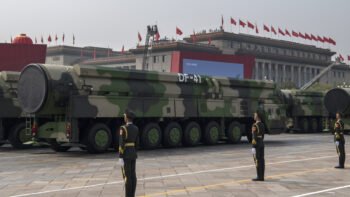
CAPITOL HILL: The vice-chiefs of the Army and Marine Corps warned legislators today that sequestration would force the military and the nation to break enlistment contracts with up to 225,000 troops who would have to be precipitately discharged to save money.
“We would absolutely not be able to keep faith with our people,” said Gen. Joseph Dunford, assistant commandant of the Marine Corps, at a hearing of the Senate Armed Services subcommittee on military readiness. “We’d be breaking contracts and sending people on their way who believe they have a commitment,” he said. “These are the very people who are in Afghanistan [today]. Their reward when they come home will simply be to dismiss them.”
Already, under the President’s proposed budget, the Army and Marine Corps will cut 107,000 troops over fiscal years 2013-2017. If sequestration hit, however, the two services estimate they’d have to cut another 118,000: 18,000 Marines, 50,000 Army regulars, and 50,000 Army National Guard troops. Worst of all, however, both services are relying on supplemental “Overseas Contingency Operations” funding to let them ramp down at a reasonable rate, by attrition instead of kicking people out, because their base budgets only cover their reduced endstrengths. Since sequestration would kill the OCO supplemental too, Dunford said, instead of shedding 20,000 marines over five years, sequestration would force the Corps to cut 38,000 almost overnight. Vice-Chief of Army Staff Gen. Lloyd Austin didn’t go into as much detail, but between his remarks and other published sources, sequestration would accelerate the Army’s cutbacks from 87,000 soldiers over five years to 187,000 all at once. That’s a total of 225,000 troops laid off in a hurry.
“We tend to look at sequestration as a budget issue,” said Gen. Dunford. “It’s really not a budget issue. It’s a reordering of our national priorities.” With the 38,000 hit to the Corps, he said, “we would not have capacity to meet a single major contingency operation.”
Such cuts would hammer the morale and readiness of the servicemembers left behind. “All of us came into the military in the late 1970s,” Dunford went on. “I know what a hollow force is because I was a platoon commander in a hollow force.”
“I worry a lot about the health of our force,” echoed Army Vice-Chief Austin. “We have the most resilient force that we could have ever imagined,” he said. “15 years ago if you’d told me [that] we were going to be in combat for a decade and be able to keep our soldiers and our family members with us, I would not have believed that, [but] I’m really concerned about our ability to continue to do that.”
Under gentle prodding from New Hampshire Republican Kelly Ayotte, all four service vice-chiefs agreed it was “urgent” not only to stop sequestration but to do so soon, rather than waiting until the last minute.
“I’m worried that there’s a general feeling around here that we can kick this can until December to make the decision on how to avoid defense sequestration,” asked Sen. Ayotte. “How do we not break the faith [with our troops]? Isn’t there an urgency?”
“Absolutely,” said Gen. Austin. “If we didn’t have that sword of Damocles hanging over us we’d be in much better shape.”
From Boeing’s struggles to inflation relief funds: 5 industry stories from 2024
Making a year-end list in which she forces references to Taylor Swift songs for no reason has basically become reporter Valerie Insinna’s favorite Christmas tradition.



























